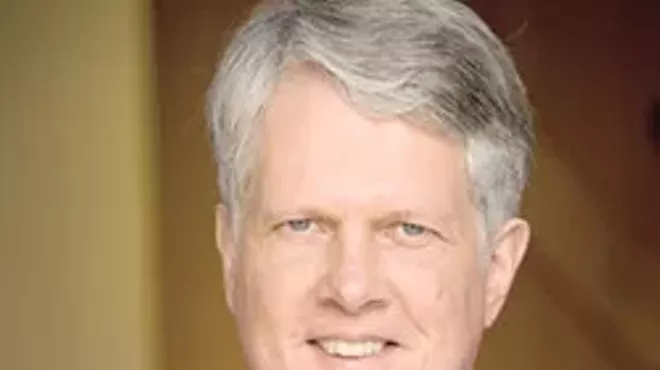Few public officials have been as ardent as Ben Stuckart in condemning the city for the way it's handled the sexual harassment allegations raised by former police spokeswoman Monique Cotton against former Police Chief Frank Straub.
But on March 14, Stuckart was faced with his own similar test: How would he handle a complaint about one of the city council's own? A woman approached Stuckart and raised concerns about Richard Rush, Councilwoman Candace Mumm's legislative aide.
"Some people don't have good boundaries," Stuckart says. "Some people, when they ask people out on dates, and they're told no, ask them a second time. And then sometimes they ask them a third time to go on a date, and that makes people feel uncomfortable."
This was one of those cases, Stuckart says. Two days later, Stuckart and Human Resources Director Heather Lowe met with the complainant to discuss her concerns.
Stuckart says the conclusion — from HR and the city's legal department — was that Rush's conduct didn't constitute any kind of harassment. No laws or city policies were violated.
"There was no inappropriate touching, there was no inappropriate trying-to-kiss-somebody," Stuckart says. "It was off-site, it was a citizen event, it wasn't a city event."
Stuckart, Mumm and Lowe had scheduled a time to meet with Rush and discuss the issue. But before that could happen, Lowe relayed other similar concerns city employees had raised about Rush.
"I did not get a lot of details," Mumm says. But she says that didn't matter — she'd already made the decision to fire Rush and hire another assistant. That day, March 31, she fired him. And that was it. Rush — who had spent four years as a city councilman and two years as a legislative assistant — was gone.
COMPARE AND CONTRAST
Exactly one year before the day Rush was fired, Straub was lobbing profanity and crude insults at Cotton and other members of police leadership, according to records. The incident led to Cotton meeting behind closed doors with the mayor a few days later. She told officials Straub had "grabbed her ass and tried to kiss her." She said she wanted a transfer to a different job, but wanted to keep it quiet. Cotton was transferred, Straub was fired six months later, and public record requests revealed false statements from city leadership.
Today a $4 million lawsuit from Straub and an independent investigation into the matter are still ongoing.
Stuckart takes out a pen, flips over a piece of paper and starts diagramming the differences between how he and Mumm handled the concerns about Rush, and how the mayor handled the much more serious concerns about Straub.
"There's vast differences," Stuckart says. "I keep charting it out, and charting out what the mayor did, and I'm like, our chart — we did it right."
The mayor met with Cotton alone, promised her a transfer to a new position, and never initiated an HR investigation. Stuckart, by contrast, says he and Mumm went by the book, meeting with the complainant with HR present and conducting an investigation.
"This is all unfortunate for Richard. It's unfortunate for the citizens who were made to feel uncomfortable. But I think we handled it correctly by asking HR to investigate," Stuckart says. "Candace and I handled the situation pretty damn well, I think."
On the other hand, while Straub's ouster was announced in a public press conference, Rush's firing was handled quietly, without the public being told it had even happened.
Stuckart says he didn't announce Rush's termination to the press because the investigation had not revealed Rush had violated city policy and because he was fired as an at-will employee.
"An appointed police chief is different than a legislative aide," Stuckart says, explaining the difference. (But in 2014, Stuckart was critical of the city's refusal to publicly explain why it had forced the resignation of Planning Director Scott Chesney. "Government should be open and transparent," he said then.)
Even Rush was left completely in the dark.
"I have an at-will employee, and I don't have to give him a reason," Mumm says. "He was not let go for cause."
Before Rush was terminated, he says he was never told by anyone — not Mumm, not Stuckart, not Lowe — that there were any complaints.
"HR investigation? This is the first I have heard of it," Rush wrote after being contacted by the Inlander last Friday. "Candace let me go without explanation. Can you shed light on any of this for me?"
A few hours earlier, in response to a question from the Inlander, Stuckart had openly described the concerns about Rush surrounding his termination.
By then, rumors about Rush had already leaked out into the general public, thanks in part to an April 11 email that Lowe sent to a number of city managers concerning Rush's behavior.
"I thought it was inappropriate and shouldn't have been sent out," Stuckart says.
THE PERSONAL AND THE POLITICAL
The council has shifted in a more liberal direction over the past six years, and Rush considers himself a crucial part of that story. He says he recruited Councilwomen Mumm and Amber Waldref to run for office, as well as former Councilman Jon Snyder. When Rush served on the council, Lori Kinnear was his legislative aide. Today, she's a councilmember.
Rush doesn't level any criticism for the way his former colleagues handled his termination.
"I don't think I was mistreated in any way by Ben or Candace," Rush says.
But that's not to say he's fine with all that happened. He says he first learned about his concerns from HR in mid-April, after he'd been fired, when Lowe wrote him a letter.
"[Lowe wrote] there were two city employees who had said not to bug them or not to call them," Rush says. "I could continue to interact with the city as a citizen, but I could not call any city employees on their work time."
In his reply to Lowe, Rush says, he denied the suggestion that anything improper had occurred, and wrote that if Lowe continued to contact him about those "false allegations" he would seek legal counsel.
"The target of the complaint never knows about it or hears about it, and they can't make a defense?" Rush says.
He echoes frustrations raised by Straub — that he never had the chance to defend his actions. He says his interactions with the employees named in the letter have been minimal, and nothing remotely inappropriate had occurred.
"My relationships with them were cordial and civil, and quite frankly, I never heard the word 'Stop,' 'No,' 'Back off,' none of that," Rush says. "One of those people I've seen once, or maybe three times in passing. We're talking people I had just met; they're acquaintances."
All of this may feel familiar.
Rush faced a similar controversy when he was a city councilmember. Former County Commissioner Todd Mielke says the head of the Spokane Regional Transportation Council approached him with concerns about Rush's interactions with a female employee. Mielke says he was told that a female staff member was bothered by how much Rush was contacting her, and the nature of his invitations to spend time together outside of work. "She was not comfortable making a formal complaint, and just wanted the activity to stop," Mielke says.
In 2008, for example, Rush emailed a female employee inviting her to have lunch at his house, if she was in the mood for a sandwich.
Both Mumm and Stuckart say they hadn't ever heard of those concerns until recently.
"This is the first I've heard that kind of information," Mumm says. "I wish I would have known that."
Rush says he's familiar with the old controversy, but speculates that both the controversy then and the controversy now may be politically motivated.
"Given my political success, it's no surprise," Rush says. "Countervailing political forces would just as soon see me sidelined." ♦




























